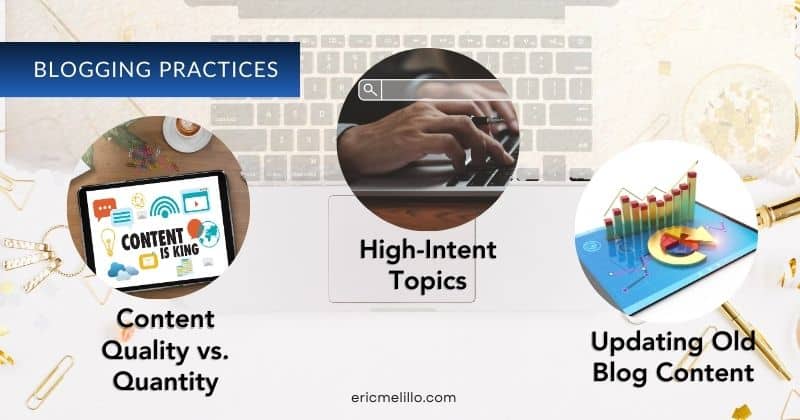Transitioning to professional blogging? The key lies in perfecting content creation, SEO, and monetization. Without these, your blog may not reach its full potential, affecting both performance and income.
However, with the correct strategies, professional blogging can be both creatively fulfilling and financially rewarding.
Drawing on my experience, I’ve navigated these challenges by applying targeted SEO, creating compelling content, and employing effective monetization strategies, resulting in notable traffic and revenue growth.
Let me share insights and tips to help boost your blog and achieve the success you desire.
What is Professional Blogging?

Professional blogging is creating and managing a blog as a full-time career. Successful professional bloggers typically focus on a niche or specific area of expertise to attract and retain their audience. Building a loyal following is crucial for professional bloggers as it helps them establish credibility and increase their influence in their respective fields.
To thrive in professional blogging, individuals must possess strong writing skills to produce engaging content that captivates readers. Knowing SEO (Search Engine Optimization) is essential for professional bloggers to ensure their content ranks well on search engines, driving organic traffic to their blogs.
Time management skills play a vital role in the success of professional bloggers, enabling them to juggle multiple tasks efficiently while meeting deadlines consistently.
Professional blogging offers various advantages:
- Opportunity for individuals to showcase expertise
- Potential for substantial income through monetization strategies
- Flexibility in working hours and location
However, there are also challenges associated with professional blogging:
- Intense competition within popular niches
- Consistent need for fresh and engaging content creation
- Uncertainty regarding stable income streams
Professional and Hobbyist Bloggers
Distinguishing between professional and hobbyist bloggers lies mainly in the level of commitment and approach towards blogging. While both types share similarities, such as producing content regularly, professional bloggers treat their blogs as businesses rather than personal hobbies.
For aspiring professional bloggers, investing time in honing writing skills can significantly impact the quality of content produced. Understanding SEO principles allows professional bloggers to optimize their posts effectively for search engines, increasing visibility among target audiences.
Moreover, mastering time management techniques enables professional bloggers to maintain consistency in publishing schedules while managing other aspects like marketing and networking efforts.
Key differences between hobbyist and professional bloggers
- Commitment level towards blog development.
- Approach towards monetization strategies.
- Emphasis on building brand partnerships for revenue generation.
Skills for Professional Bloggers
Crafting engaging content involves keyword research to target popular search terms, enhancing blog post visibility. Creating high-quality and valuable content is crucial for improving search engine rankings. Optimizing meta tags and headers can also significantly boost the visibility of blog posts.
Find your Voice and Style
In professional blogging, honing different skills like developing a unique voice and style helps bloggers stand out from competitors. Consistency in branding across all platforms builds trust with the audience. Engaging with readers through comments and social media aids in establishing a strong personal brand.
SEO Strategies for Bloggers
SEO strategies are essential in professional blogging as they help increase blog traffic organically. Developing a unique voice and style sets bloggers apart in crowded online spaces. Consistency in branding across various platforms builds credibility with the audience over time.
Engagement is vital to blogger success; interacting with readers through comments and social media fosters a loyal following. Responding to negative feedback or criticism gracefully showcases professionalism within the blogging community.
Marketing for Blog Growth
Marketing strategies are pivotal for achieving growth as a professional blogger since they drive traffic to blogs effectively. Displaying blog ads can generate income through ad revenue streams, providing financial stability to sustain blogging endeavors long-term.
Affiliate marketing allows bloggers to earn commissions by promoting products or services relevant to their niche.
Collaborating on sponsored content with brands presents another avenue for monetization, allowing bloggers to leverage their influence while generating revenue simultaneously.
Repurposing Your Blog
Creating video content is important for professional bloggers as it attracts a larger audience and boosts engagement.
Optimizing your blog for voice search is essential due to the increasing use of voice assistants like Siri and Alexa. Ensuring your blog is mobile-friendly is key since more users access blogs through their smartphones.
Blog Repurposing Basics
- Video content engages a wider audience.
- Voice search optimization enhances accessibility.
- Mobile optimization caters to smartphone users.
Professional blogging offers avenues for money making while providing personal satisfaction. Continuously learning and adapting to new trends are vital to succeed in this field long-term. Establishing a robust network and actively engaging with your audience play significant roles in the success of professional blogging endeavors.
- Professional blogging can be financially rewarding.
- Continuous learning ensures sustained success.
- Networking and audience engagement are critical aspects.
Blogging Challenges
Professional blogging often comes with misconceptions that can hinder aspiring bloggers from pursuing their passion. One common myth is that blogging is an easy way to make quick money.
Another myth is that bloggers have unlimited free time during the day. Contrary to this belief, successful professional bloggers follow strict schedules to manage their time efficiently, often juggling a 9 to 5.
Professional Blogging Truths
In reality, successful professional bloggers invest significant time and effort into creating quality content, building an audience, and establishing credibility before seeing substantial financial returns.
They dedicate hours to writing, researching trends, engaging with their audience on social media platforms, and optimizing their blogs for search engines (SEO). Understanding these myths can help new bloggers set realistic expectations and stay committed to their long-term goals.
SEO and Industry Adaptation
Search Engine Optimization (SEO) plays a crucial role in the success of a professional blog by helping it rank higher in search engine results pages. By incorporating relevant keywords naturally into blog posts, optimizing meta descriptions and titles, improving website speed, and enhancing user experience through mobile responsiveness, bloggers can attract more organic traffic to their sites.
Industry adaptation is key to staying relevant in professional blogging.
Successful bloggers continuously monitor industry trends, adapt to algorithm changes on various platforms like Google or social media sites, day, experiment with different types of content (such as videos or podcasts), collaborate with other influencers, and attend conferences or workshops related to blogging strategies.
Blogging Practices
When selecting topics for your blog, focus on high-intent ones that address specific needs or provide solutions. High-intent topics are those that users actively search for online.
For example, if you run a blog about healthy living, consider writing about “10 Easy Ways to Incorporate Exercise into Your Daily Routine” rather than a generic post like “Why Exercise is Important.”

Choosing High-Intent Topics
To identify high-intent topics, use tools like Google Keyword Planner or AnswerThePublic to see what people are searching for related to your niche. Look for keywords with clear user intent, such as “how-to,” “best practices,” or “tips.” You can tailor your content by choosing these keywords to match what users seek.
Content Quality vs. Quantity
In professional blogging, it’s essential to balance content quality and quantity. While consistency in posting is crucial for maintaining reader engagement and SEO rankings, sacrificing quality for quantity can harm your reputation as a credible source of information. Instead of churning out multiple mediocre posts per week, focus on producing fewer but higher-quality blog posts.
Quality content attracts more readers and encourages them to stay longer on your site and return for more. Invest time researching each topic thoroughly, providing valuable insights or practical tips that readers can apply daily.
Remember, one well-researched and informative blog post can have a more significant impact than several hastily written articles.
Updating Old Blog Content
Don’t overlook the power of updating old blog posts on your website.
- Refreshing existing content helps improve its relevance and accuracy and signals search engines that your site is regularly maintained and up-to-date with current trends or information.
- When updating old blog posts, look for opportunities to add new statistics, examples, case studies, or relevant links.
Growing Your Blog
To attract more readers to your professional blogging site, optimizing for search engines is crucial. Incorporating relevant keywords in your blog posts helps search engines understand your content.
Utilize tools like Google Keyword Planner to identify popular search terms in your niche. Including internal links within your posts can also boost SEO by guiding visitors to other parts of your blog.

Driving Traffic with SEO
Creating high-quality, engaging blog content is key; longer articles rank higher on search engine results pages (SERPs). Optimizing meta descriptions and titles enhances the visibility of your posts online.
Regularly updating old blog posts with fresh information signals search engines that your site is active and relevant.
Building Trust and Value
Establishing trust with your audience is vital for successful professional blogging. Engage with readers through comments and social media platforms to foster community around your blog. Providing valuable, accurate information positions you as an authority in your field, building credibility among followers.
Collaborating with other bloggers or influencers can expand your reach and introduce new audiences to your content. Guest posting on reputable sites allows you to showcase expertise while driving traffic back to your blog. Free resources such as e-books or webinars add value for readers, encouraging them to return for more insightful content.
Success Stories
Learning from successful bloggers can provide valuable insights into achieving professional blogging success. Many top bloggers emphasize the importance of creating high-quality content consistently. They stress the need to engage with readers, respond to comments, and build a loyal audience through authenticity and transparency.
Lessons from Top Bloggers
Top bloggers also highlight the significance of effective headlines in attracting readers. Crafting compelling, informative, and intriguing headlines can significantly impact a blog’s results by increasing click-through rates and driving traffic. These successful individuals often share stories of their dedication and hard work, underscoring that sustained effort is crucial for long-term success in professional blogging.
Moreover, top bloggers frequently mention the role of SEO in boosting visibility and reaching a broader audience. By optimizing their content with relevant keywords, they aim to improve their search engine rankings and attract more organic traffic. Understanding how search engines work and leveraging this knowledge is key to rising above competitors in the crowded blogosphere.
- Consistent creation of high-quality content
- Engagement with readers through comments
- Importance of crafting compelling headlines
- Dedication, hard work, and perseverance as essential factors
- Emphasis on search engine optimization (SEO) for increased visibility
Successful bloggers often attribute part of their achievements to building strong relationships within the blogging community. Collaborating with other writers or companies can open up new opportunities for growth while expanding one’s reach beyond individual efforts alone.
Furthermore, many top bloggers stress diversifying income streams beyond traditional advertising revenue. Exploring avenues such as sponsored content, affiliate marketing, or creating digital products can help increase overall earnings while providing added value to readers.
- Building relationships within the blogging community
- Diversifying income streams beyond advertising revenue
- Exploring sponsored content opportunities
- Engaging in affiliate marketing partnerships
- Creating digital products for additional revenue sources
Starting Your Blog
The first step to starting a professional blog is choosing a niche you are passionate about. This will help you create content consistently. Next, select a blogging platform like WordPress or Blogger to set up your website easily without technical knowledge. Once your platform is ready, pick a catchy domain name and hosting service.

Creating Blog Content
After setting up the technical aspects, focus on creating high-quality content that provides value to your readers. Write engaging blog posts that solve problems or entertain your audience within your chosen niche. Remember to optimize your blog for search engines by using relevant keywords in your content and meta descriptions.
Consider strategies such as affiliate marketing, sponsored posts, or selling digital products like e-books or online courses related to your niche. Engage with other bloggers and participate in guest posting opportunities to increase visibility and reach more audiences interested in similar topics.
Expanding with Social Media
Expanding professional blogging through social media is crucial for reaching a wider audience beyond organic search traffic. Create profiles on platforms like Instagram, Twitter, Facebook, or LinkedIn based on where your target audience spends their time online. Share snippets of your blog posts and engaging captions to drive traffic to your website.
Interact with followers by promptly responding to comments and messages while sharing behind-the-scenes glimpses into your blogging journey through stories or live videos. Collaborate with influencers in your niche for shoutouts or partnerships to expose your blog to their followers who might be interested in your offer.
Utilize each platform’s social media analytics tools to track performance metrics such as engagement, click-through rates, and follower growth over time. Adjusting strategies based on these insights can help optimize social media efforts for maximum impact on growing a successful professional blog presence online.
SEO and Blog Optimization
To excel in professional blogging, it’s crucial to understand Search Engine Optimization (SEO). SEO involves optimizing your blog content to rank higher in search engine results. Regularly updating your blog with fresh, relevant content can boost its visibility online.
SEO Performance
Utilizing relevant keywords strategically throughout your posts can also improve your blog’s chances of appearing in search engine results. Incorporating internal links within your blog posts and obtaining backlinks from reputable websites can further enhance your blog’s SEO performance.
Consistently monitoring and analyzing the performance of your blog using tools like Google Analytics is essential for tracking visitor behavior, popular content, and areas for improvement. By staying informed about current SEO trends and best practices, you can adapt your blogging strategies to meet evolving search engine algorithms effectively.
Digital Marketing Learning
In the realm of professional blogging, understanding digital marketing principles is indispensable. Learning how to promote your blog effectively through social media platforms like Facebook, Instagram, Twitter, or Pinterest can significantly increase traffic to your site. Engaging with followers through comment sections or direct messages fosters a sense of community around your blog.
Moreover, mastering email marketing techniques such as creating newsletters or automated campaigns enables you to reach a broader audience and nurture relationships with readers over time. Collaborating with other bloggers or influencers in related niches can expand the reach of your content and attract new followers to grow a loyal readership base.
Blogging as a Career
Becoming a professional blogger can be an exciting journey. Many successful bloggers started their careers by creating content on topics they were passionate about. Over time, as their audience grew, they monetized their blogs through various channels like sponsored posts, affiliate marketing, and selling digital products.
The Career Path in Blogging
One of the key advantages of pursuing blogging as a career is the flexibility it offers. Bloggers have the freedom to work from anywhere with an internet connection. They can choose their working hours and create content that resonates with them and their audience. However, building a successful blog requires dedication and consistency in producing high-quality content.
When starting out as a blogger, it’s essential to identify a niche or topic you know or are passionate about. This will help you attract blog readers who are interested in your content. Once you have established your blog and gained some traction, you can explore different monetization strategies such as advertising revenue, sponsored content opportunities, or creating and selling digital products like e-books or online courses.
Pros:
- Flexibility in work schedule
- Opportunity to showcase creativity
- Potential for passive income streams
Cons:
- Requires consistent effort to build an audience
- Income may be unpredictable initially
Final Thoughts
Starting a professional blog combines your passion with the potential for earnings. This guide has covered essential aspects such as improving your writing, mastering SEO, and strategies for making money and expanding your audience. It’s a comprehensive plan for turning a hobby into a profitable online business.
Implement these strategies to enhance your blog. We invite you to share your experiences or questions in the comments and contribute to our community of bloggers. Keep an eye out for further advice to keep your blog competitive and successful in professional blogging.
FAQs
How do I become a professional blogger?
To become a professional blogger, select a niche, create a content strategy, and consistently produce high-quality, SEO-optimized posts. Engage with your audience, utilize social media for promotion, and monetize your blog through ads, sponsorships, and affiliate marketing. Continuous learning and adaptation are key.
Can you make $1000 a month blogging?
Earning $1000 a month from blogging is achievable through diverse monetization strategies such as affiliate marketing, sponsored content, advertisements, and selling digital products or services. Success depends on niche, audience engagement, and consistent, high-quality content creation.
What does it mean to have a professional blog?
A professional blog is a content platform managed to build brand authority, engage a targeted audience, and drive business goals. It typically involves strategic content creation, SEO optimization, and monetization methods for revenue generation.
How much do pro bloggers make?
Professional bloggers’ earnings vary widely, ranging from a few hundred to over $100,000 per month. Income depends on factors like niche, traffic, monetization strategies, and affiliate marketing effectiveness. Top earners often combine multiple revenue streams for maximized profits.



